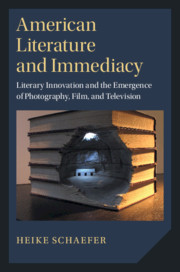 American Literature and Immediacy
American Literature and Immediacy from Part III - Literary Immediacy and Television
Published online by Cambridge University Press: 19 December 2019
Discussing works by Robert Coover and David Foster Wallace, this chapter argues that the critical remediation of TV’s aesthetics of immediacy provided an innovative impetus for the experimental postmodernist fiction of the 1960s and 70s and the literary fiction of the 1980s and 90s. Among the first generation of writers to address TV, Coover parodies in his short story “The Babysitter” how TV conflates the fictive and the real by eroding the boundaries between on- and off-screen worlds. The story plays with narrative levels to debunk TV’s logic of spectacle and consumption. Twenty years later, Wallace likewise explores how TV alters our sense of the real. Yet he distances himself from the ironical stance he finds characteristic of both his postmodernist precursors and of TV. In his essay “E Unibus Pluram” and short stories like “Little Expressionless Animals,” he advocates a return to a self-reflexive poetics of sincerity. Although their poetics and historical moment differ, both Coover and Wallace rework televisual immediacy effects to challenge TV’s promise of direct participation and connection and to expand the representational reach and cultural pertinence of literature.
To save this book to your Kindle, first ensure no-reply@cambridge.org is added to your Approved Personal Document E-mail List under your Personal Document Settings on the Manage Your Content and Devices page of your Amazon account. Then enter the ‘name’ part of your Kindle email address below. Find out more about saving to your Kindle.
Note you can select to save to either the @free.kindle.com or @kindle.com variations. ‘@free.kindle.com’ emails are free but can only be saved to your device when it is connected to wi-fi. ‘@kindle.com’ emails can be delivered even when you are not connected to wi-fi, but note that service fees apply.
Find out more about the Kindle Personal Document Service.
To save content items to your account, please confirm that you agree to abide by our usage policies. If this is the first time you use this feature, you will be asked to authorise Cambridge Core to connect with your account. Find out more about saving content to Dropbox.
To save content items to your account, please confirm that you agree to abide by our usage policies. If this is the first time you use this feature, you will be asked to authorise Cambridge Core to connect with your account. Find out more about saving content to Google Drive.